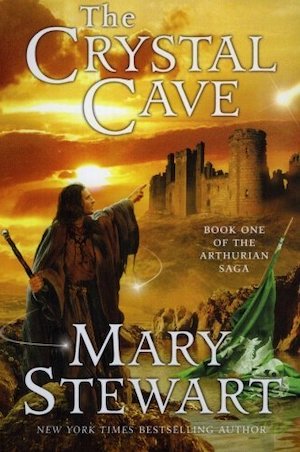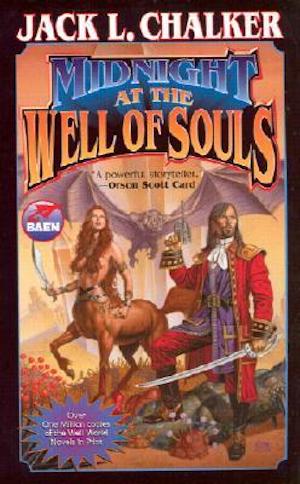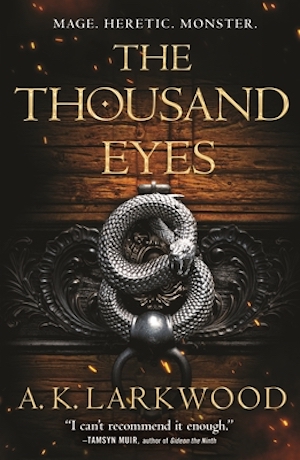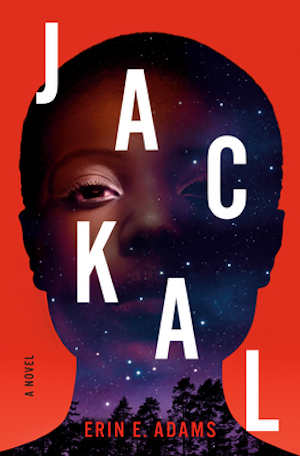Every so often, I get an odd run of books sharing a particular plot element or type of character, despite having been selected for reasons unrelated to that element or character. There was, for example, a week in which every novel I read featured a protagonist who lost a hand as a side effect of violent dynastic disputes.
More recently, I encountered four books in one week that featured active, interventionist gods. It was a remarkable coincidence, particularly as the four books are otherwise quite dissimilar. Identifying the books is something of a spoiler, so here, have a free spoiler alert before reading further!
The Crystal Cave by Mary Stewart (1970)

The Crystal Cave is the first of five volumes retelling the well-known Arthurian saga. Stewart’s twist in the first three books was to select as her viewpoint character Merlin. Merlin’s version of events begins when he was a boy, a bastard born to a Welsh princess in strife-torn post-Roman Britain.
Many versions of Merlin are fire-ball casting sorcerers, who sometimes verge on the demonic. Stewart’s Merlin is a bright young man of purely mundane origins. While he does learn a bit of actual magic, it is minor stuff. Merlin relies more on the appearance of magic rather than the reality, playing off other people’s superstitions for his own ends.
However! Merlin does from time to time have authentically prophetic visions. These seems to be some divine entity working through Merlin to shape British history. The identity of the entity is not clear, at least to me, nor is its motive evident. Gods, even those that tamper in daily life, can be very enigmatic.
Midnight at the Well of Souls by Jack Chalker (1977)

Published only a few years after The Crystal Cave, Midnight at the Well of Souls could not be more different from the Stewart novel if it tried. Midnight is a futuristic science fiction novel in which two groups of humans (one composed of a would-be murderer and his unwilling victim to be, and the other of the passengers and crew of a star freighter) are teleported across the light years to the artificial planet known as the Well World.
Transformed by the Well World into new, alien forms, the castaways become caught up in a quest to save the universe. The Well World can be used to alter the very laws of physics, a tactic very tempting to a homicidal fanatic determined to overthrow oppressive, conformist human governments. Whether anything would survive his tampering is unclear; therefore, he must be stopped, if he can be stopped. As is common in almost all megastructure novels, this turns out to involve a tremendous amount of walking from one place to another.
The Markovian aliens who built the Well World were mortals who gained godlike powers. Somewhat to the surprise of the characters in Chalker’s novel, one of their number gained godlike power by actually being a god. Having a god onside for a team effort is tremendously useful, provided one does not (as a number of the antagonists do) piss the god off enough to attract a smiting.
The Thousand Eyes by A. K. Larkwood (2022)

In this second and final volume in the Serpent Gates duology, murder-hoboes-for-hire Csorwe, Qanwa Shuthmili, and Talasseres Charossa provide an archaeologist with sufficient protection to reach and explore relics of the long-vanished Echentyri empire. It is not enough protection to save the archaeologist, who is killed by Cherenthisse, a fanatical acolyte of the empire (she had been preserved in stasis for thousands of years; the group revived her).
It would be logical to kill the acolyte, but no…she could tell us so much about the past! Our heroes spare Cherenthisse and bring her back to civilization. Bad move.
Cherenthisse occupies herself with a couple of hobbies. First: trying to find some way to resurrect Cherenthisse’s dead snake goddess. Second: rebuilding the empire, bringing about a new golden age of horrific oppression. This would be bad. It is up to the adventurous trio to stop Cherenthisse.
They comprehensively fail: good news for the reader, who is provided with thrilling tales of the Resistance, but very bad news for the protagonists and many bystanders.
Larkwood’s sword-and-sorcery setting features an abundance of gods. Most of the gods appear to be determined to demonstrate why having an abundance of actively interventionist gods is a bad thing. Were this not bad enough, the plot is driven by the fact that gods are very hard to kill. Even dead gods can get do-overs, provided there is suitable mortal container into which the god can be decanted. “Possessed by a dead god” seems to be about as common a malady in Larkwood’s setting as measles is in ours.
Jackal by Erin E. Adams (2022)

Haitian American Liz Rocher very reluctantly returns to Johnstown, PA to attend her best friend Mel’s wedding. The marriage crosses race lines; Johnston being the sort of community that it is, Liz expects the celebration to be strained at best and filled with thinly veiled racist comments. She does not expect Mel’s daughter Caroline to vanish while under Liz’s insufficiently watchful eye.
Liz’s faith in the Johnstown police (at least where Black or mixed-race victims are concerned) is limited. Years ago, the police failed to solve Keisha Woodson’s kidnapping and murder. Liz discovers the situation is even worse than she knew. Caroline and Keisha are just two of a long string of vanished Black girls; many of the disappearances have been followed by the discovery of the victim’s gutted corpse. Can Liz find Caroline in time to save her? Can she avoid being framed by a killer who seems to have an inside line on Liz’s efforts?
I’d seen Jackal billed as horror, so it was not surprising that there is a supernatural element. An actual living god was still something of a surprise. Also noteworthy is the manner in which the god is discussed; the author makes it clear that the god is not to blame for the killings. While the serial killings provide it with an opportunity and it certainly encourages them, it’s only taking advantage of an existing situation. No convenient “the devil made me do it” handwashing here.
***
Aside from including a living god in the dramatis personae, the four novels above didn’t share much else. One is a historical fantasy, one is futurist SF, one is a secondary world fantasy, and one is a modern-day supernatural murder mystery. It is a lesson in how a seemingly straightforward concept can be implemented in a diversity of ways, across any number of genres.
No doubt other examples may come to mind, books I did not mention for obvious reasons. If you’d like to mention them, comments are, as ever, below.
In the words of fanfiction author Musty181, four-time Hugo finalist, prolific book reviewer, and perennial Darwin Award nominee James Davis Nicoll “looks like a default mii with glasses.” His work has appeared in Interzone, Publishers Weekly and Romantic Times as well as on his own websites, James Nicoll Reviews (where he is assisted by editor Karen Lofstrom and web person Adrienne L. Travis) and the 2021 and 2022 Aurora Award finalist Young People Read Old SFF (where he is assisted by web person Adrienne L. Travis). His Patreon can be found here.










